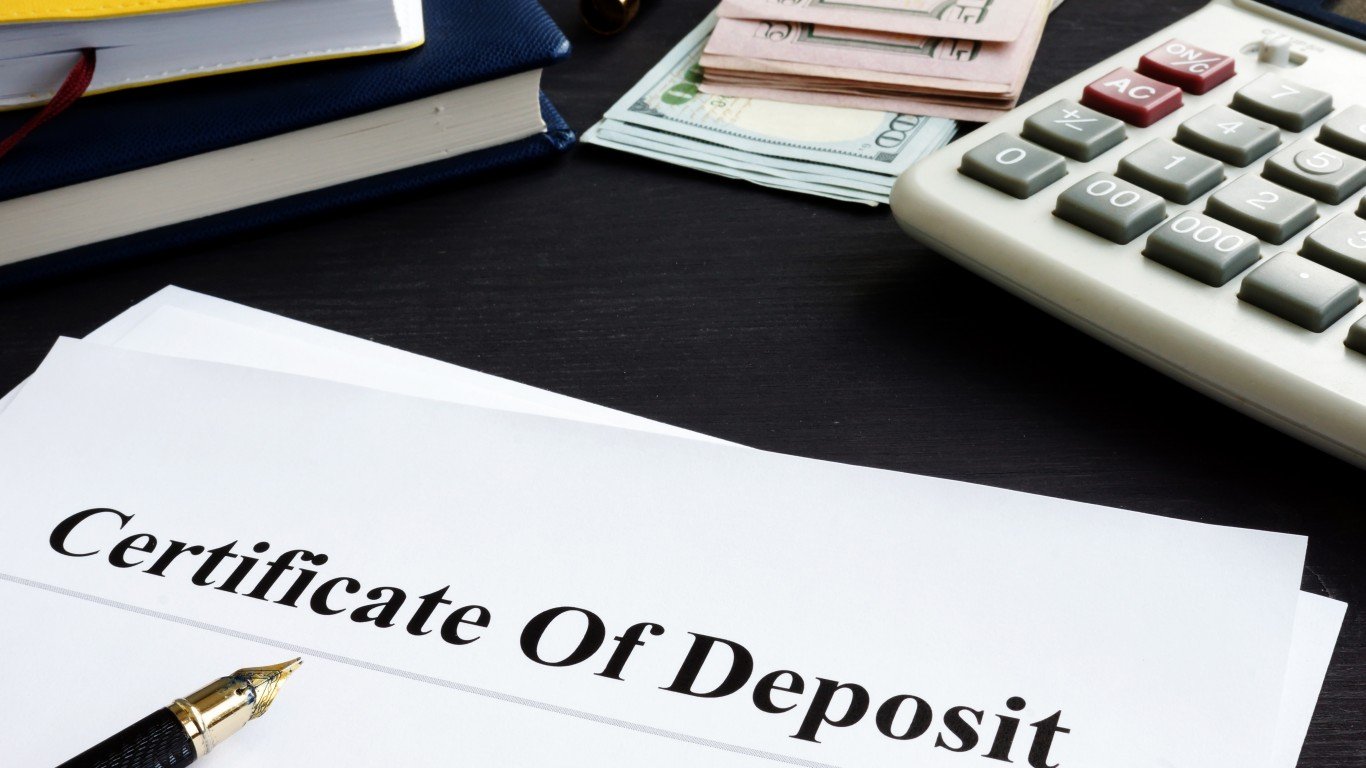

Think your investing days are over when you retire? Think again. After amassing your retirement portfolio during your working years, you still must invest your money to keep it growing and providing income in your golden years.
Especially now with inflation soaring to 9.1% in June, the highest level since 1981, you are going to need some extra cash to cover living expenses. But investing during retirement is much different than in earlier stages in life, when income is still coming in. In retirement, you want to avoid risky bets and opt for safer investments offering steady, although not spectacular, returns. (See record inflation driving up prices for these 40 household items.)
24/7 Wall St. created a list of eight investment strategies for retirees based on a report produced by financial technology company SmartAsset, What Should Retirees Invest In?
Bonds, certificates of deposit, and mutual funds can provide the income you need as a retiree while insulating you from the rollercoaster ride of the tumultuous stock market. The goal is to preserve your nest egg and not lose a large chunk if the market tanks.
Yet that does not mean you cannot take some degree of risk. Investing in stocks is fine, so long as you put your money in conservative, dividend-yielding plays. In general, retirees should look for investments that provide a reliable income stream that also protect their hard-earned savings from any deep cuts. Have $100,000? Here are the 20 best ways to invest the money.
Click here to see the 8 best investments for retirees.

1. Cash
During retirement, you still need cash at hand to cover everyday or unexpected expenses. You may even want cash for leisure trips. But how much cash should you have on the ready? Many financial advisors may suggest having enough cash to cover three to six month of living expenses, though one expert suggests having enough to cover 12 to 24 months. Anything less and you might have to sell other assets in a down market or unfavorable conditions. To make your cash work harder, put the dollars in a high yielding savings account rather than a checking account. Or put it in the next option.
[in-text-ad]

2. Money market account
Money market accounts are fixed income securities that earn a modest interest rate. Yet the investments are stable – a key concern for retirees. The interest rate is generally higher than with a bank savings account. Although the rate of return is relatively low, money market accounts are good places to stash emergency funds. Beware of inflation when investing in a money market account, however. If inflation rises above the rate offered in the account, your money could lose some of its value.

3. Bonds
As you built up your retirement savings during your working years, bonds would not have been your first choice. The low return rate is not very attractive to younger investors. When you switch to managing a portfolio in retirement, bonds are an ideal choice. Although your money will grow steadily and likely match inflation, you will not see the high returns possible in stock investing. Bonds offer lower risk investing at a time when you do not want to see the volatility of the stock market crater your savings.

4. Bond ladder
A series of bond investments with staggered maturities, a bond ladder provides diversification within a bond portfolio. You are not locked in with one bond for a prolonged period, which can expose you to the ups and downs of the bond market, and you still enjoy the different monthly incomes from the coupon payment. With a bond ladder, you also have access to relatively liquid money by having bonds that are steadily maturing over time.
[in-text-ad-2]

5. Stocks
Investing in stocks when you are retired is slightly more risky, but has several advantages to careful investors. Conservative, dividend-paying stocks can offer higher returns than certificates of deposit and U.S. Treasury notes. Steer clear of the latest hot stocks and invest in large cap stocks that have a long track record of paying dividends and increasing the payouts. A good rule of thumb is to have no more than a third of your investments in stocks if you are 65 or older.

6. Mutual funds
Want to invest in stocks and bonds and have a professional pick the investments? Mutual funds could be the answer. Mutual funds invest in stocks and bonds to mitigate risk through diversification. Another option is to invest in a retirement income fund, which is a type of mutual fund offering both a steady income and growth potential.
[in-text-ad]

7. Certificates of deposit
A low risk investment, certificates of deposit, or CDs, offer an interest rate premium. In exchange, the bank or credit union keeps your money for a specified period of time, which can range anywhere from a month to 10 years. When the term is up, you will get your money back plus interest earned. Shop around for the best rates. Set aside money in a CD for when you may need it later in retirement, because you will be penalized if you withdraw early.

8. Real estate rentals
Buying a rental property and pocketing the rental income is one way to get a steady money source in retirement. If you purchase the right property at the right price, you can easily cover the mortgage and taxes and net yourself some extra dollars. The downside? As a landlord, you are responsible for maintenance, or you can hire a management company to do the work for you.
Sponsored: Find a Qualified Financial Advisor
Finding a qualified financial advisor doesn’t have to be hard. SmartAsset’s free tool matches you with up to 3 fiduciary financial advisors in your area in 5 minutes. Each advisor has been vetted by SmartAsset and is held to a fiduciary standard to act in your best interests. If you’re ready to be matched with local advisors that can help you achieve your financial goals, get started now.
Thank you for reading! Have some feedback for us?
Contact the 24/7 Wall St. editorial team.
 24/7 Wall St.
24/7 Wall St. 24/7 Wall St.
24/7 Wall St.


